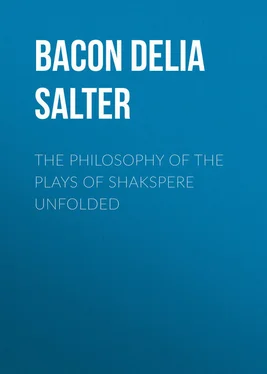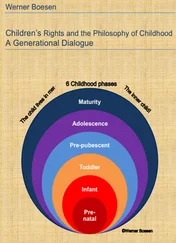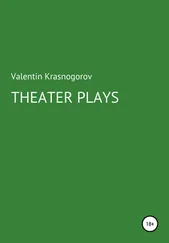Delia Bacon - The Philosophy of the Plays of Shakspere Unfolded
Здесь есть возможность читать онлайн «Delia Bacon - The Philosophy of the Plays of Shakspere Unfolded» — ознакомительный отрывок электронной книги совершенно бесплатно, а после прочтения отрывка купить полную версию. В некоторых случаях можно слушать аудио, скачать через торрент в формате fb2 и присутствует краткое содержание. Жанр: literature_19, foreign_antique, foreign_prose, на английском языке. Описание произведения, (предисловие) а так же отзывы посетителей доступны на портале библиотеки ЛибКат.
- Название:The Philosophy of the Plays of Shakspere Unfolded
- Автор:
- Жанр:
- Год:неизвестен
- ISBN:нет данных
- Рейтинг книги:3 / 5. Голосов: 1
-
Избранное:Добавить в избранное
- Отзывы:
-
Ваша оценка:
- 60
- 1
- 2
- 3
- 4
- 5
The Philosophy of the Plays of Shakspere Unfolded: краткое содержание, описание и аннотация
Предлагаем к чтению аннотацию, описание, краткое содержание или предисловие (зависит от того, что написал сам автор книги «The Philosophy of the Plays of Shakspere Unfolded»). Если вы не нашли необходимую информацию о книге — напишите в комментариях, мы постараемся отыскать её.
The Philosophy of the Plays of Shakspere Unfolded — читать онлайн ознакомительный отрывок
Ниже представлен текст книги, разбитый по страницам. Система сохранения места последней прочитанной страницы, позволяет с удобством читать онлайн бесплатно книгу «The Philosophy of the Plays of Shakspere Unfolded», без необходимости каждый раз заново искать на чём Вы остановились. Поставьте закладку, и сможете в любой момент перейти на страницу, на которой закончили чтение.
Интервал:
Закладка:
It is this patient piecing and renewing of his broken webs, it is this second building up of his position rather than the first, that shows us what he is. One must see what he contrived to make of those 'apartments' in the Tower while he occupied them; what before unimagined conveniencies, and elegancies, and facilities of communication, and means of operation, they began to develop under the searching of his genius: what means of reaching and moving the public mind; what wires that reached to the most secret councils of state appeared to be inlaid in those old walls while he was within them; what springs that commanded even there movements not less striking and anomalous than those which had arrested the critical and admiring attention of Tarleton under the Tudor administration, – movements on that same royal board which Ferdinand and Miranda were seen to be playing on in Prospero's cell when all was done, – one must see what this logician, who was the magician also, contrived to make of the lodging which was at first only 'the cell' of a condemned criminal; what power there was there to foil his antagonists, and crush them too, – if nothing but throwing themselves under the wheels of his advancement would serve their purpose; one must look at all this to see 'what manner of man' this was, what stuff this genius was made of, in whose hearts ideas that had been parted from all antiquities were getting welded here then – welded so firmly that all futurities would not disjoin them, so firmly that thrones, and dominions, and principalities, and powers, and the rulers of the darkness of this world might combine in vain to disjoin them – the ideas whose union was the new 'birth of time.' It is this life in 'the cell' – this game, these masques, this tempest, that the magician will command there – which show us, when all is done, what new stuff of Nature's own this was, in which the new idea of combining 'the part operative' and the part speculative of human life – this new thought of making 'the art and practic part of life the mistress to its theoric' was understood in this scholar's own time (as we learn from the secret traditions of the school) to have had its first germination: this idea which is the idea of the modern learning – the idea of connecting knowledge generally and in a systematic manner with the human conduct – knowledge as distinguished from pre-supposition – the idea which came out afterwards so systematically and comprehensively developed in the works of his great contemporary and partner in arts and learning.
We must look at this, as well as at some other demonstrations of which this time was the witness, to see what new mastership this is that was coming out here so signally in this age in various forms, and in more minds than one; what soul of a new era it was that had laughed, even in the boyhood of its heroes, at old Aristotle on his throne; that had made its youthful games with dramatic impersonations, and caricatures, and travesties of that old book-learning; that in the glory of those youthful spirits – 'the spirits of youths, that meant to be of note and began betimes' – it thought itself already competent to laugh down and dethrone with its 'jests'; that had laughed all its days in secret; that had never once lost a chance for a jibe at the philosophy it found in possession of the philosophic chairs – a philosophy which had left so many things in heaven and earth uncompassed in its old futile dreamy abstractions.
Unless philosophy can make a Juliet, Displant a town, reverse a prince's doom, Hang up philosophy, was the word of the poet of this new school in one of his 'lofty and passionate' moods, at a much earlier stage of this philosophic development. 'See what learning is!' exclaims the Nurse, speaking at that same date from the same dictation, for there is a Friar 'abroad' there already in the action of that play, who is undertaking to bring his learning to bear upon practice, and opening his cell for scientific consultation and ghostly advice on the questions of the play as they happen to arise; and it is his apparent capacity for smoothing, and reconciling, and versifying, not words only, but facts, which commands the Nurse's admiration.
This doctrine of a practical learning, this part operative of the new learning for which the founders of it beg leave to reintegrate the abused term of Natural Magic, referring to the Persians in particular, to indicate the extent of the field which their magical operations are intended ultimately to occupy; this idea, which the master of this school was illustrating now in the Tower so happily, did not originate in the Tower, as we shall see.
The first heirs of this new invention, were full of it. The babbling infancy of this great union of art and learning, whose speech flows in its later works so clear, babbled of nothing else: its Elizabethan savageness, with its first taste of learning on its lips, with its new classic lore yet stumbling in its speech, already, knew nothing else. The very rudest play in all this collection of the school, – left to show us the march of that 'time-bettering age,' the play which offends us most – belongs properly to this collection; contains this secret, which is the Elizabethan secret, and the secret of that art of delivery and tradition which this from the first inevitably created, – yet rude and undeveloped, but there .
We need not go so far, however, as that, in this not pleasant retrospect; for these early plays are not the ones to which the interpreter of this school would choose to refer the reader, for the proof of its claims at present; – these which the faults of youth and the faults of the time conspire to mar: in which the overdoing of the first attempt to hide under a cover suited to the tastes of the Court, or to the yet more faulty tastes of the rabble of an Elizabethan play-house, – the boldest scientific treatment of 'the forbidden questions,' still leaves so much upon the surface of the play that repels the ordinary criticism; – these that were first sent out to bring in the rabble of that age to the scholar's cell, these in which the new science was first brought in, in its slave's costume, with all its native glories shorn, and its eyes put out 'to make sport' for the Tudor – perilous sport! – these first rude essays of a learning not yet master of its unwonted tools, not yet taught how to wear its fetters gracefully, and wreathe them over and make immortal glories of them – still clanking its irons. There is nothing here to detain any criticism not yet instructed in the secret of this Art Union. But the faults are faults of execution merely; the design of the Novura Organum is not more noble, not more clear.
For these works are the works of that same 'school' which the Jesuit thought so dangerous, and calculated to affect unfavourably the morality of the English nation – the school which the Jesuit contrived to bring under suspicion as a school in which doctrines that differed from opinions received on essential points were secretly taught, – contriving to infect with his views on that point the lady who was understood, at that time, to be the only person qualified to reflect on questions of this nature; the school in which Raleigh was asserted to be perverting the minds of young men by teaching them the use of profane anagrams; and it cannot be denied, that anagrams, as well as other 'devices in letters,' were made use of, in involving 'the bolder meanings' contained in writings issued from this school, especially when the scorn with which science regarded the things it found set up for its worship had to be conveyed sometimes in a point or a word. It is a school, whose language might often seem obnoxious to the charge of profanity and other charges of that nature to those who do not understand its aims, to those who do not know that it is from the first a school of Natural Science, whose chief department was that history which makes the basis of the ' living art,' the art of man's living, the essential art of it, – a school in which the use of words was, in fact, more rigorous and scrupulous than it had ever been in any other, in which the use of words is for the first time scientific, and yet, in some respects, more bold and free than in those in which mere words, as words, are supposed to have some inherent virtue and efficacy, some mystic worth and sanctity in them.
Читать дальшеИнтервал:
Закладка:
Похожие книги на «The Philosophy of the Plays of Shakspere Unfolded»
Представляем Вашему вниманию похожие книги на «The Philosophy of the Plays of Shakspere Unfolded» списком для выбора. Мы отобрали схожую по названию и смыслу литературу в надежде предоставить читателям больше вариантов отыскать новые, интересные, ещё непрочитанные произведения.
Обсуждение, отзывы о книге «The Philosophy of the Plays of Shakspere Unfolded» и просто собственные мнения читателей. Оставьте ваши комментарии, напишите, что Вы думаете о произведении, его смысле или главных героях. Укажите что конкретно понравилось, а что нет, и почему Вы так считаете.












